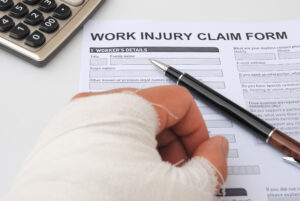How to File a Workers’ Compensation Claim

Sustaining a work-related injury can be overwhelming and distressing. However, navigating the workers’ compensation claim process can help alleviate some of the stress. In this blog post, we will guide you through the steps involved in filing a workers’ compensation claim.
Whether you have recently suffered an injury or want to be ready in case of an accident, this information will empower you to take the necessary steps towards securing the compensation you deserve.
If you need assistance with your workers’ compensation claim, don’t hesitate to contact a law firm near you.
An experienced Anderson workers’ compensation lawyer is ready to fight for your rights and get you the benefits you deserve. The sooner you act, the sooner you’ll have peace of mind that you placed your claim in the right hands.
When is it Appropriate to File a Workers’ Comp Claim?
Knowing when to file a workers’ compensation claim is the first step.
Here are some scenarios in which it is appropriate to file a claim:
- Accidents resulting in injuries: If you sustain an injury while performing your work duties, whether it’s a slip and fall, an object falling on you, or equipment malfunction, you should file a claim.
- Occupational illnesses: If you develop an illness due to exposure to hazardous substances, such as asbestos or chemicals, as a result of your job, you may be eligible for compensation.
- Repetitive stress injuries: If your job requires repetitive motions, such as typing or lifting, and you develop an injury related to these activities, you may have a valid workers’ compensation claim.
Remember, every case is unique, so you must consult a workers’ compensation attorney to determine what you can recover in your situation.
Common Workplace Injuries
Workplace injuries can range from minor to severe and can occur in any industry
Some common workplace injuries include:
- Slips, trips, and falls: These accidents can occur due to wet or uneven surfaces, inadequate lighting, or obstacles in walkways.
- Repetitive strain injuries: Conditions such as carpal tunnel syndrome, tendonitis, and bursitis can result from repetitive motions, often associated with office work or manual labor.
- Back and neck injuries: Lifting heavy objects, poor ergonomics, and sudden movements can lead to sprains, strains, and herniated discs.
- Burns and electrical injuries: Employees in industries like construction, manufacturing, and food service may be at risk for burns and electrical injuries
- Fractures: Falls from heights or accidents involving heavy machinery can lead to broken bones.
- Respiratory conditions: Exposure to harmful substances, such as asbestos, silica, or chemical fumes, can cause lung diseases like asbestosis, silicosis, or occupational asthma.
Some work injuries are acute and happen in an accident, while others might develop over time. Both types of injuries are compensable under the workers’ comp system.
Common Job-Related Illnesses

In addition to injuries, workers may also suffer from job-related illnesses.
Some common job-related illnesses include:
- Occupational diseases: Long-term exposure to hazardous substances can result in illnesses such as mesothelioma, lung cancer, or skin conditions.
- Hearing loss: Exposure to loud noises in industries like construction, manufacturing, or entertainment can lead to permanent hearing loss.
- Mental health conditions: High-stress work environments, workplace harassment, or traumatic events can contribute to conditions such as anxiety, depression, or post-traumatic stress disorder (PTSD).
Just because you cannot see a job-related illness like you can see a wound does not mean the illness is not as real or serious as acute injuries. Many work illnesses can have lasting effects on your life.
Steps in the Workers’ Compensation Claim Process
Now that we have covered the types of injuries and illnesses that can occur, let’s walk through the steps involved in filing a workers’ compensation claim.
Report the Injury to Your Employer
The first step is to report your injury or illness to your employer as soon as possible. Most states have a deadline for reporting workplace injuries, so it’s important to notify your employer within the specified timeframe.
Provide details of the incident, including when and where it occurred and any witnesses present.
Seeking Immediate Medical Treatment
After reporting the injury, seek immediate medical attention. Your health and well-being should always be a priority. Depending on the severity of your injury, you may need to visit an emergency room or an approved healthcare provider.
Always inform the medical professional that your injury is work-related, as they will document this in your medical records.
Following Doctor’s Orders
Follow your doctor’s instructions and adhere to the prescribed treatment plan. This includes attending follow-up appointments, participating in rehabilitation programs, and taking any prescribed medications. Failure to follow your treatment plan may negatively impact your workers’ compensation claim.
Consulting a Workers’ Compensation Attorney
While it’s possible to navigate the workers’ compensation claim process on your own, consulting a workers’ compensation attorney can greatly increase your chances of a successful claim.
An attorney with experience in workers’ compensation law can guide you through the process, help gather evidence, and advocate for your rights.
How Workers’ Compensation Works
Workers’ compensation is a no-fault system. This means that regardless of who is at fault for the accident, injured workers can receive benefits. Whether it was an employer’s negligence, a co-worker’s mistake, or even your own error, you may recover compensation.

No-fault workers’ compensation laws are in place to protect workers and ensure they do not face the financial burden of their injuries. The system provides support for employees, allowing them to focus on recovering rather than worrying about medical bills and lost income.
Remember that even though workers’ compensation is a no-fault system, obtaining the benefits you deserve can still be challenging. Insurance companies may minimize your claim or deny it altogether. That’s why you need a skilled attorney by your side. They will fight for your rights and advocate for the maximum compensation you deserve.
What Must You Prove for a Successful Workers’ Compensation Claim?
Even though you do not have to prove fault to seek workers’ comp benefits, you still must prove the basic elements of your claim.
To have a successful workers’ compensation claim, you must establish:
- Employment relationship: You must demonstrate that you were an employee at the time of the injury or illness. Independent contractors and volunteers may not be eligible for workers’ compensation benefits.
- Work-relatedness: The injury or illness must have occurred in the course of your employment. It’s important to establish a clear connection between your work and the injury or illness you suffered.
- Timely reporting: Promptly reporting the injury or illness to your employer is crucial. Failing to report within the specified timeframe may result in a denial of your claim.
- Medical evidence: Providing medical evidence that supports your claim is essential. This may include medical records, diagnostic tests, and expert opinions.
In short, you must demonstrate that your injury is work-related and led to medical bills and/or lost income. This might seem simple, but insurance companies can challenge even the most seemingly straightforward workers’ comp claims.
How Insurance Companies Challenge Workers’ Comp Claims
It’s not uncommon for insurance companies to challenge the validity of your workers’ comp claim. Despite these frustrating and overwhelming challenges, you have rights and options.
Insurance companies often try to argue that your injury or illness is not work-related, especially if there isn’t an obvious cause or if it occurred over time. They may claim that it happened outside of work. However, workers’ compensation covers a wide range of work-related injuries and illnesses, including those that develop gradually or result from repetitive motions.
Another common tactic by insurance companies is to claim that you have a preexisting condition that was not caused or aggravated by your work. They may argue that your injury or illness was already present before you started working or was caused by something unrelated to your job.

However, workers’ compensation should cover both new injuries and aggravations of preexisting conditions. As long as your work contributed to the development or worsening of your condition, you may still be entitled to benefits.
Insurance companies may also challenge the necessity of the medical treatment you received or the time you took off work. They may argue that the treatment you received was excessive or unnecessary, or that you should have returned to work sooner than you did.
To support your claim, you must have thorough documentation of your medical treatment and work restrictions. This can include medical records, doctor’s notes, and any other evidence demonstrating the extent of your injury or illness and its impact on your ability to work.
You also want to hire a workers’ comp lawyer as soon as possible, especially if you face any challenges from insurance companies. They can handle all communications and negotiations to prove the benefits you deserve.
How a Workers’ Compensation Attorney Can Benefit Your Claim
Hiring a workers’ compensation attorney can be instrumental in ensuring the success of your claim. Here are a few ways an attorney can benefit your claim:
Gathering Evidence of the Cause of Your Injury
An experienced workers’ compensation attorney knows how to gather the necessary evidence to establish the cause of your injury or illness. They can collect medical records, interview witnesses, and consult with experts to build a strong case on your behalf.
Handling All Insurance Communications
Navigating insurance paperwork and communications can be overwhelming. A workers’ compensation attorney can handle all interactions with the insurance company on your behalf, protecting your right to the full benefits you deserve under the law.
They ensure you do not unintentionally say something to insurers that might jeopardize your claim.
Addressing Delays in the Claim Process
Delays in the workers’ compensation claim process are common. An attorney can expedite the process by preparing all necessary paperwork, meeting deadlines, and advocating for your rights.
Ensuring You Receive the Full Benefits You Deserve
Insurance companies may try to minimize the compensation they offer or deny your claim altogether. An attorney can negotiate on your behalf to ensure you receive the full benefits you are entitled to, including medical expenses, lost income, and rehabilitation costs.
Can Your Workers’ Compensation Claim be Denied?
While it’s unfortunate, workers’ compensation can deny claims.
Some reasons for denial include:
- Failure to report the injury within the specified timeframe
- Lack of evidence establishing a clear work-related connection to the injury or illness
- Disputes regarding the severity or long-term effects of the injury or illness
- Incomplete or inaccurate documentation
If your workers’ compensation claim is denied, don’t lose hope. Your attorney can navigate the appeals process. They will gather additional evidence, prepare a strong case, and represent you at hearings to fight for the benefits you deserve.
Consult a Workers’ Comp Lawyer Near You Immediately
If you’ve suffered an injury on the job, consult a workers’ comp lawyer as soon as possible. Navigating the workers’ compensation system can overwhelm you, and having an experienced attorney can make a significant difference in the outcome of your claim.
An experienced workers’ comp lawyer can gather the necessary evidence to support your claim. They will know what documentation is necessary to strengthen your case, such as medical records, accident reports, and witness statements.

By working with a lawyer, you can ensure that all relevant evidence gets collected and presented effectively, increasing your chances of a successful claim.
Consulting a workers’ comp lawyer can provide you with peace of mind during this challenging time. Dealing with a workplace injury can be physically, emotionally, and financially draining. Having a legal professional on your side can alleviate some of the stress and burden, allowing you to focus on your recovery.
Remember, consultations with workers’ comp lawyers are typically free, so there’s no reason not to reach out and seek legal advice. By consulting with an attorney promptly, you can protect your rights, gather the necessary evidence, and navigate the workers’ comp process with confidence.
Don’t wait – consult a workers’ comp lawyer near you immediately to ensure that you receive the full compensation you deserve.


